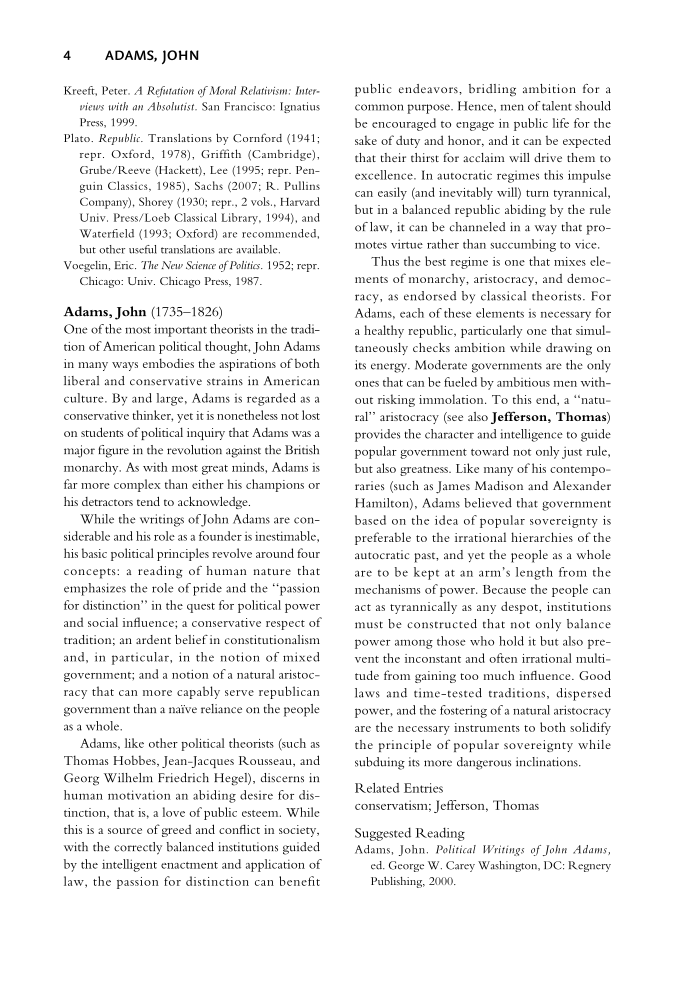Kreeft, Peter. A Refutation of Moral Relativism: Inter- views with an Absolutist. San Francisco: Ignatius Press, 1999. Plato. Republic. Translations by Cornford (1941 repr. Oxford, 1978), Griffith (Cambridge), Grube/Reeve (Hackett), Lee (1995 repr. Pen- guin Classics, 1985), Sachs (2007 R. Pullins Company), Shorey (1930 repr., 2 vols., Harvard Univ. Press/Loeb Classical Library, 1994), and Waterfield (1993 Oxford) are recommended, but other useful translations are available. Voegelin, Eric. The New Science of Politics. 1952 repr. Chicago: Univ. Chicago Press, 1987. Adams, John (1735–1826) One of the most important theorists in the tradi- tion of American political thought, John Adams in many ways embodies the aspirations of both liberal and conservative strains in American culture. By and large, Adams is regarded as a conservative thinker, yet it is nonetheless not lost on students of political inquiry that Adams was a major figure in the revolution against the British monarchy. As with most great minds, Adams is far more complex than either his champions or his detractors tend to acknowledge. While the writings of John Adams are con- siderable and his role as a founder is inestimable, his basic political principles revolve around four concepts: a reading of human nature that emphasizes the role of pride and the ‘‘passion for distinction’’ in the quest for political power and social influence a conservative respect of tradition an ardent belief in constitutionalism and, in particular, in the notion of mixed government and a notion of a natural aristoc- racy that can more capably serve republican government than a naıve ¨ reliance on the people as a whole. Adams, like other political theorists (such as Thomas Hobbes, Jean-Jacques Rousseau, and Georg Wilhelm Friedrich Hegel), discerns in human motivation an abiding desire for dis- tinction, that is, a love of public esteem. While this is a source of greed and conflict in society, with the correctly balanced institutions guided by the intelligent enactment and application of law, the passion for distinction can benefit public endeavors, bridling ambition for a common purpose. Hence, men of talent should be encouraged to engage in public life for the sake of duty and honor, and it can be expected that their thirst for acclaim will drive them to excellence. In autocratic regimes this impulse can easily (and inevitably will) turn tyrannical, but in a balanced republic abiding by the rule of law, it can be channeled in a way that pro- motes virtue rather than succumbing to vice. Thus the best regime is one that mixes ele- ments of monarchy, aristocracy, and democ- racy, as endorsed by classical theorists. For Adams, each of these elements is necessary for a healthy republic, particularly one that simul- taneously checks ambition while drawing on its energy. Moderate governments are the only ones that can be fueled by ambitious men with- out risking immolation. To this end, a ‘‘natu- ral’’ aristocracy (see also Jefferson, Thomas) provides the character and intelligence to guide popular government toward not only just rule, but also greatness. Like many of his contempo- raries (such as James Madison and Alexander Hamilton), Adams believed that government based on the idea of popular sovereignty is preferable to the irrational hierarchies of the autocratic past, and yet the people as a whole are to be kept at an arm’s length from the mechanisms of power. Because the people can act as tyrannically as any despot, institutions must be constructed that not only balance power among those who hold it but also pre- vent the inconstant and often irrational multi- tude from gaining too much influence. Good laws and time-tested traditions, dispersed power, and the fostering of a natural aristocracy are the necessary instruments to both solidify the principle of popular sovereignty while subduing its more dangerous inclinations. Related Entries conservatism Jefferson, Thomas Suggested Reading Adams, John. Political Writings of John Adams, ed. George W. Carey Washington, DC: Regnery Publishing, 2000. 4 ADAMS, JOHN
Document Details My Account Print multiple pages
Print
You have printed 0 times in the last 24 hours.
Your print count will reset on at .
You may print 0 more time(s) before then.
You may print a maximum of 0 pages at a time.

























































































































































































































































































































































































